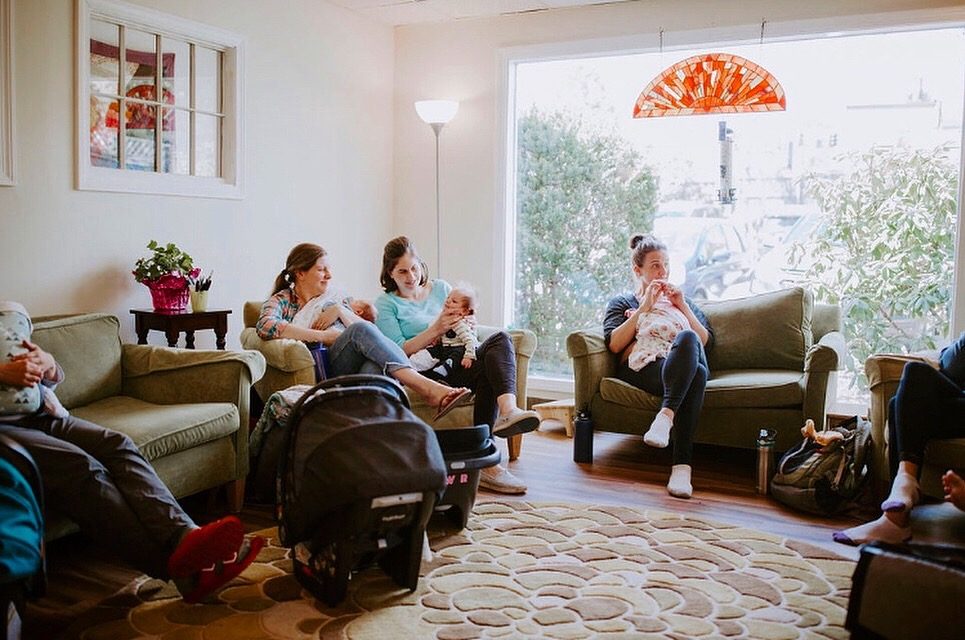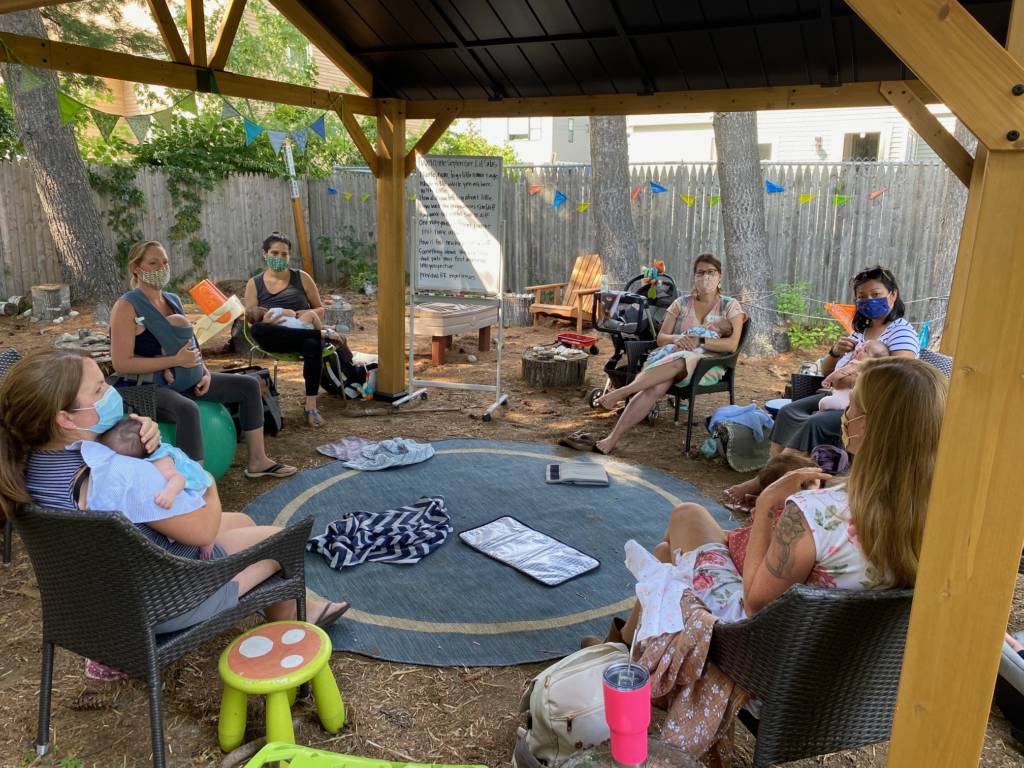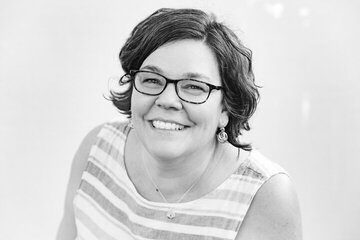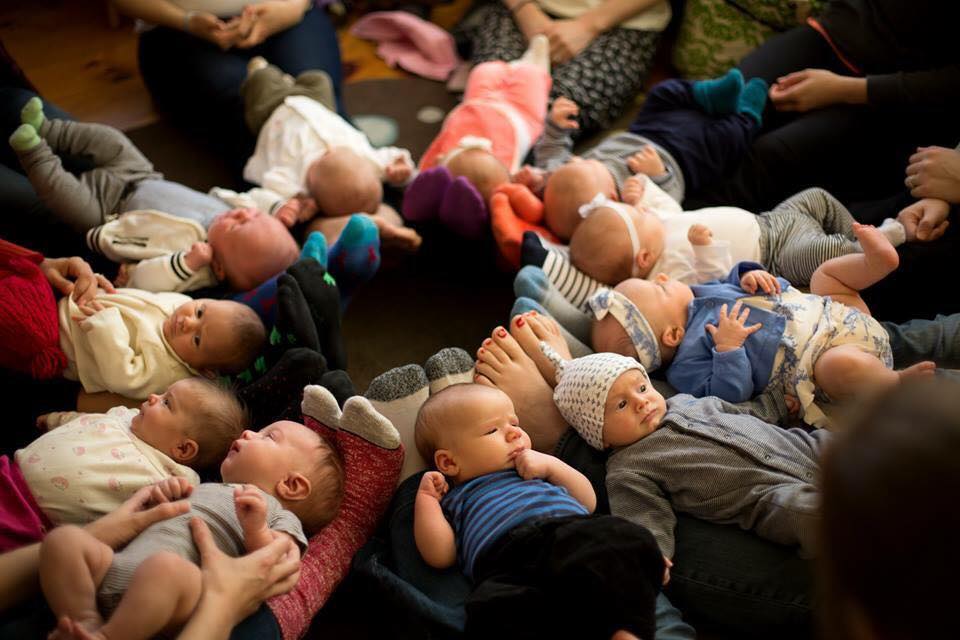The experience of pregnancy and new parenthood can be daunting and overwhelming. Co-founder Leah Deragon explains how Birth Roots brings parents together to create meaningful conversation and community. Hannaford has supported Birth Roots through the Bloomin’ 4 Good and Community Bag Programs.
Tell us about Birth Roots.
Our mission as an organization is to provide a community space during expectant, new and early parenthood, where families can find each other, build connections, share diverse ideas and strengthen their parenting resources. For nearly 20 years, Birth Roots has been challenging outdated narratives surrounding the perinatal period.
We started in 2003-2004 when Emily Murray and I were doulas. Doulas provide nonclinical support to families going into the hospital to give birth; they bring this nonclinical care person to help them with reassurance, information, comfort, massage and communication. And we realized that there was a documented doula effect. By having this person be with you through this very intense and overwhelming experience, even though it was a nonclinical intervention, it was improving clinical outcomes. Emily and I had the thought, what if we could have that doula effect for the community of parents, not just one family at a time, one birth at a time, but on an entire community-based level? What if there was a community space where because we were able to validate people’s experience and give them more perspective and, most importantly, help them find each other, the impacts and the outcomes were improved through a nonclinical intervention?
And that has proved true. We’ve accomplished several things that are important to mention. We’ve created a more accurate message, a more responsive model and a growing movement or mindset toward what we call community-supported parenting. This model is trauma informed, oxytocin informed and human development informed. And the reason that’s important to spell out is that the previous models were not informed about these things. People were having excellent clinical care, but families during this window of vulnerability have nonclinical needs that have nonclinical solutions.

Birth Roots really pioneered the idea that through this doula effect, or this nonclinical intervention, clinical outcomes can be improved by tending to families’ needs for connection, for community, for validation, for perspective, for the kinds of information that couldn’t possibly be covered in a 15-minute postnatal visit six weeks after you gave birth. We created the conditions for people to tell their stories and in a sense, rewrite their narrative about what it means to become a parent and to take on that new identity in that new role. As the founders of the organization, we were listening and by deeply listening, not just to people’s words, but listening with our whole nervous system, we were having many realizations about what these families really needed.
We incorporated as a nonprofit organization in 2004 and we have continued to listen in that deeper way to what parents need. What parents needed in 2004 is not the same as what they need in 2022. We focus on really staying relevant and responsive to what new parents need today.
For the first four or five years of our existence there weren’t smartphones or social media. Helping parents find each other in the absence of these methods that we take for granted today was a part of hosting gatherings and groups on different topics and focuses. We learned quickly that while new parents wanted to gather around certain topics, they didn’t actually want us to lecture to them, or even bring in an expert to do a sort of top-down instructional time. They wanted to talk to each other. And that’s really the model that we have. It’s an inquiry-based model where over the years we have improved our ability to ask really good questions.
So, when people arrive, rather than tell them, we ask them: What is harder than you thought? What do you wish you knew? What is just surprising you? And when people start to hear each other and answer those questions, their entire nervous system relaxes, and that is ultimately what people wanted, was this calming of the nervous system. So earlier when I said that our approach was human development informed and oxytocin informed, that’s referencing a hormone. The body releases a hormone called oxytocin, creating those conditions for the nervous system to relax. Where Birth Roots shines is in understanding that humans need to be able to let their guard down, take their armor off and allow themselves to reveal their vulnerability to each other. In doing this bonding happens when you feel connected. So, we coined the phrase “find your flock.”
The challenges, the struggles, the ways in which new parents or early parenthood can be overwhelming and can have wear and tear on your mental health is a very invisible aspect of our society.
The demands being placed on the primary caregiver are so great and so intense and so overwhelming that if you attempt to do this alone, it has a really negative impact on your mental health. Birth Roots spans the time you find out you’re pregnant until your child graduates from toddlerhood at 36 months, enabling what we call a co-regulating experience with other people who are currently parenting either a newborn or a toddler. That’s the window of vulnerability but it’s really a window of invisibility. The challenges, the struggles, the ways in which new parents or early parenthood can be overwhelming and can have wear and tear on your mental health is a very invisible aspect of our society. And there isn’t a lot making it less invisible. One of the problems Birth Roots sought to address was the two-fold vulnerability and invisibility of early parenthood.
What services does Birth Roots provide to the community?
We didn’t set out to increase the number of childbirth education classes that were available. How we achieve our mission is providing groups and classes and spaces and time, designated with carefully curated questions. The model that had existed for a really long time was to suffer in silence, in quiet desperation. We set out to really change that narrative. Support, whether it be community support like Birth Roots does, or policy level support like family leave that’s available to everybody, is not a nicety. It’s a necessity if you want a healthy population of healthy people. When people have a community of other parents to touch base with and say, is this normal, is this something I should really be worried about or not, it doesn’t feel like they’re in a free fall.
I think an important thing that Birth Roots would want the community to know about our organization is it’s very rooted in what we call pluralism, and pluralism is the idea that two contradictory ideas can be true at the same time, or more simply stated, one size doesn’t fit all. Let’s just take, for example, how you put your child to sleep; do they cry it out or do you rock them to sleep? Birth Roots is not here to prescribe trending parenting practices. The parents can talk about that if they want, but we as an organization are not here to say you should or should not do this right.

We benefit from each other’s perspective and each other’s input. Promotion of the concept of pluralism is really central to the work that we do, that not everyone needs to be parenting in the same way for us to identify as a flock or a community of people who are able to support each other very well. And just the skill of how to support each other is not necessarily anything we would know how to do inherently. Birth Roots models what it looks like to support each other, what it looks like to affirm somebody who’s taking a different path than you’re taking.
Tell us a story that illustrates the good work you are doing.
I think probably my favorite thing about Birth Roots is that we have people who met in the first trimester of a pregnancy, and they took a childbirth class together and they took a new postpartum class together and they took a toddler class together. And the bonds that were forged and formed in those times of intense vulnerability were so powerful that they have lasted.
We didn’t know in the beginning if the connections would continue beyond when the children start kindergarten. But we have high schoolers whose parents are still connected because the conditions that we created were that meaningful and relevant. These connections have lasted a decade or more and people still will stop me on the street and say, “I’m still in touch with the people I met.” It’s so meaningful, especially given that we get so isolated and separated from each other. In the pandemic, it’s only exacerbated that.
What achievement is your organization most proud of?
Because we have changed the landscape, we’ve raised the bar of what parents can expect. There was an acceptance of the isolation that we changed and said this is not how it has to be, and we’re not going to tell you how it has to be. We’re going to ask you how you want it to be. What do you need? What do you want? What would make it better?
We’ve been able to move that needle, particularly for new mothers, from being alone, being isolated, and being vulnerable to postpartum depression and anxiety, to creating a map for these new families that says here’s how to avoid some of the pitfalls. What I’m most proud of is how we have changed the landscape over the last 20 years from a time and a place where none of this existed to a time when this is considered essential and something that people wouldn’t imagine proceeding without.
What are the most important things you want others to know about Birth Roots?
The work that we do is much more about the inner work of parenthood than it is about specific child development or specific parenting practices. Those things come out as what I would call a side dish, such as should I do it like this or like that? Is my child learning this or should she be learning that? Those are the side dish to the main course, which is the inner work of parenting, not repeating things that happened in my childhood that may have been traumatic or unfruitful. It’s asking the question what kind of parent do I want to be and how will I accomplish that? We’re serving the expectant, new and early parenthood window in a very specific way that very much prioritizes the inner work of parenthood over the simple transfer of knowledge.
The work that we do is much more about the inner work of parenthood than it is about specific child development or specific parenting practices.
The second thing I would want people to understand about us as an organization is that concept of plurality; it’s very central to what we do. You will not find anyone at Birth Roots who says you should or should not do X. We’re here to help people clarify for themselves, write their own story, be the author of that own narrative and make it safe for you to claim your experience as your own and do it in your own way.
I think the third thing would be that Birth Roots is not a static organization that is outdated or living in the 20 years ago past, but it’s very much growing and changing and evolving as the circumstances demand. And while the demographics of Maine 20 years ago reflected one kind of population, the current demographics of Greater Portland and Cumberland County are more diverse.
Birth Roots is doing the inner work as an organization to be able to show up for families who represent all different walks of life, languages spoken, places of origin and sexual orientation. We’re not only thinking about what one kind of parent needs, but we’re thinking about how all parents don’t need the same thing, not just in which kind of method to feed their baby or which way to do diapers or which way to help their baby sleep. But they’re living very different lives and we don’t want to make that invisible. We want to bring it all in. And so, Birth Roots continues to evolve and not stagnate.
How are you using the funds raised from Hannaford Reusable Bag and Bloomin’ 4 Good programs?
I think one of the things that has happened as a result of the pandemic, an unintended consequence, is that while some businesses or organizations closed, others went through a time of rapid growth that they were maybe not quite ready for. And I would put birth rates in the category of rapid growth. And so, our capacity definitely needs to grow in order to respond to the demands for our services.
But in addition to that, one of the things that’s top of mind for us is accessibility, and we don’t just mean providing scholarships, which we definitely do, but an expansion of who are we reaching. Can we specifically target and reach out to people who are not finding out about Birth Roots so that it’s not just whoever happens to find us or whoever has the wherewithal to seek us out, but that we’re actively reaching out to the demographics that are not finding us.

Published December 2, 2021.
